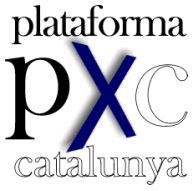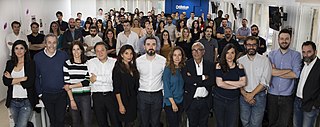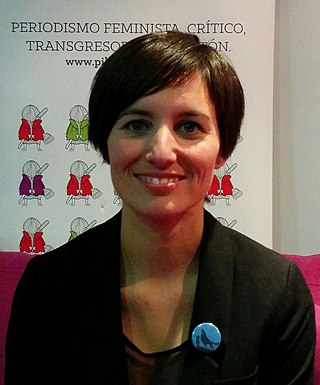
El País is a Spanish-language daily newspaper in Spain. El País is based in the capital city of Madrid and it is owned by the Spanish media conglomerate PRISA.

The media of Puerto Rico includes local radio stations, television stations and newspapers; for the majority of all these the language is Spanish. There are also three stations of the US Armed Forces Radio and Television Service.
El Periódico de Catalunya, also simply known as El Periódico, is a morning daily newspaper based in Barcelona, Catalonia, Spain.

Platform for Catalonia was a far-right political party rooted in Catalonia, Spain, which centred its political agenda around controlling immigration and was opposed to Catalan independence. It was strongly anti-Islamic and was widely considered a racist, xenophobic far-right political force. Its leader was Josep Anglada, town councillor in Vic.
The Associated Whistleblowing Press (AWP) is a not-for-profit information agency based in Brussels, Belgium, dedicated to the defense of human rights by promoting transparency, freedom of information and speech, whistleblowing and investigative journalism, conceived as a global network made up of cooperative local platforms and actors. According to its website, the initiative aims to work in a decentralized network structure, with local platforms that deal with local information, contexts and actors in a "from the roots upward model". The stories produced will then be published on the project's multilanguage newsroom under a Creative Commons license. The team consists of collaborators spread all around the world, led by two editors, Pedro Noel and Santiago Carrion.

María Elena Meneses Rocha was a Mexican journalist, professor of journalism and researcher into media, communications and the Internet with the Monterrey Institute of Technology and Higher Education, Mexico City. On the campus she taught and was the coordinator of the Cátedra Sociedad de la Información, which does research and consulting in mass media and information technology. She also worked with mass media, as a writer and as a commentator for print, broadcast and Internet media, mostly commenting on information technologies.
Javier Esteinou Madrid is a Mexican journalist, professor and researcher whose work has been recognized with Level III membership in the Sistema Nacional de Investigadores and with Mexico’s National Journalism Prize twice. His work is mostly concerned with the effects of cultural hegemony and new technologies on communications and society.

En Marea was a political party and former political alliance integrated by Podemos, Anova, United Left of Galicia, and some municipal alliances that participated in the 2015 Spanish local elections. It was formed in November 2015 as an electoral coalition to contest the 2015 Spanish general election in Galicia. As part of the coalition agreement with Podemos, the name on the ballot paper for both the 2015 and 2016 general elections was Podemos–En Marea–Anova–EU.

elDiario.es is an online newspaper based in Spain. Founded in 2012 and published only in Spanish, it has been available since 18 September 2012. eldiario.es is managed by Ignacio Escolar, a journalist who was the first editor of Público. eldiario.es includes amongst its staff the former journalists of Público upon cessation of its print edition. It is published by the company 'Diario de Prensa Digital S.L.' eldiario.es reported that in 2016, it had revenues of 3,680,172 euro and 3,184,280 in expenses, with a profit of 340,030 euro. eldiario.es published every three months a magazine monograph, called Cuadernos.
Ideal is a daily Spanish language newspaper edited and published in Granada.
Rubén Juste de Ancos is a Spanish sociologist, researcher and political consultant.
El Español is a Spanish online newspaper that started in 2015. It has its headquarters in Avenida de Burgos, 16D, 7º, Madrid, Comunidad de Madrid.
El Salto is a Spanish alternative newspaper, with formats both online and offline. Online, it is a daily newspaper, while in paper it is a quarterly magazine, with 7 different versions depending on the Spanish region. This newspaper was established after the merge of 20 alternative media including Diagonal, the feminist magazine Pikara Magazine or the economist magazine El Salmón Contracorriente.
Goteo is a crowdfunding site which focuses on projects which, apart from giving individual rewards, also generate a collective return through promoting the commons, open source code and/or free knowledge. It allows contributions in the form of monetary donations or in the form of tasks collaborating with the projects. The platform started in 2011, and is run by the Barcelona-based non-profit Goteo Foundation. According to its site statistics, as of 2023, it has raised $17 million, with a rate of project success of 83%, and a community of 185.000 users. It claims it was the first free/open source crowdfunding platform, and it tags itself as "the open source crowdfunding platform".

June Fernández Casete is a Spanish journalist. She is a co-founder and the director of the feminist Pikara Magazine.

Grupo Godó de Comunicación, S. A., doing business as Grupo Godó, is a Spanish media conglomerate based in Barcelona. Its assets include the daily newspapers La Vanguardia and Mundo Deportivo and the Catalan radio station RAC1.

Grupo Zeta was a Spanish media conglomerate which owned several newspapers and magazines. Founded by Antonio Asensio in 1976, it launched the magazines Interviú and Tiempo before its most successful title, the daily newspaper El Periódico de Catalunya. From 1986 to 2017, it owned the publishing house Ediciones B. In 2008, debts of €140 million led to the company making large redundancies and taking a €245 million loan. Grupo Zeta was acquired by Prensa Ibérica in 2019, a year after shutting down the physical copies of its first two magazines. Its assets at the time were eight newspapers and twelve magazines.
Wayka is a nonprofit online newspaper based in Peru that describes itself as an organization dedicated to promoting democracy, the protection of human rights and achieving the common good. The website believes that information accessibility is a human right not to be commoditized and that the media should remain independent from financial and political influence. The number of readers is between one and three million.









